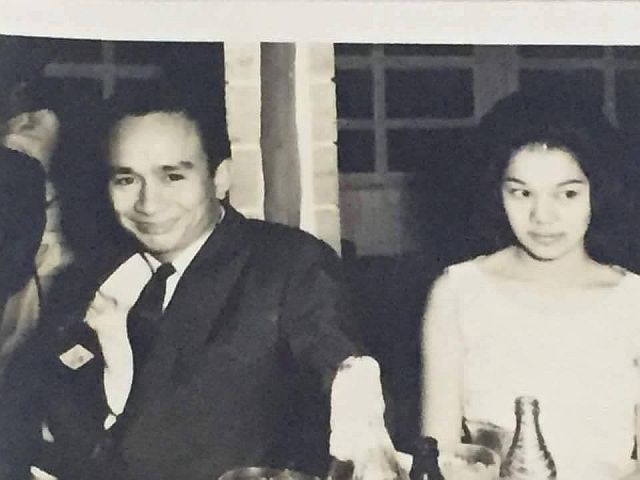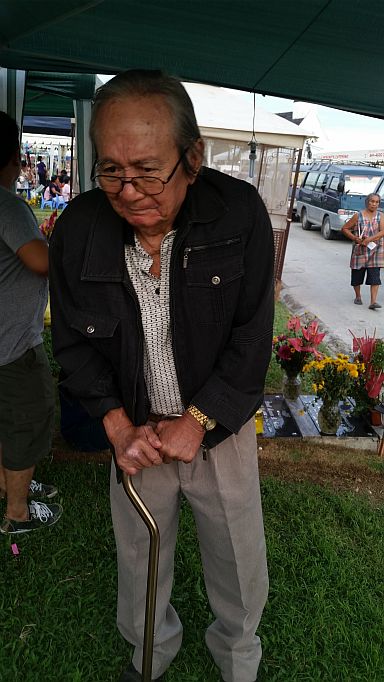
Hector and his wife Pilar
My mother was busy cooking some noodle dish when I arrived from school.
I sighed.
Noodles again, I thought.
For five straight days, dinner had been different varieties of noodles. Yet no one was celebrating a birthday.
It was that my father’s client paid him in kind and not in cash — noodles.
My father, Hector, was a criminal lawyer for more than four decades.
Unlike most lawyers, he believed that the profession is a vocation and not a business; he believed in fighting for the oppressed and the poor and that everybody was entitled to a good defense regardless of their status in life even if it meant that his attorney’s fees were in the form of noodles, tablea, chicken, bananas or gratis.
He once returned the payment of a seamstress whose son was detained for murder after he learned that the money came from the sewing machine that she pawned.
But my father’s passion to defend the underdog was not surprising.
When he was taking his pre-law in a university in Iloilo City, a board mate fell victim to bullies.
And Papa did the unthinkable.
In defending his friend, he faced 17 men who circled and went against him. But Papa, who may have had the face of a movie star (some had told me he looked like the matinee idol at that time, Nestor de Villa), was an amateur boxer.
He readily took down his opponents and earned the gratitude of the man he defended.
Hector, a native of Iloilo City, chose to practice law in Cebu.
In 1972, he uprooted his family and brought them to a place where he neither had relatives or friends.
Yet he grew to love Cebu where he was able to practice law and even put up an insurance adjusting firm. He later closed it down because, he said, he could not take how insurance firms take advantage of their clients.
He had earned a reputation of being a gritty lawyer whose acerbic tongue landed to those who deserved it regardless of status.
During a hearing, he once interrupted an opposing lawyer to raise an objection.

Hector Fernandez
“Your honor,” he told the judge. “There are only two languages allowed in the courtroom, English and Spanish. But my companero here is speaking in another language. He is speaking a language of a bird.”
The judge as well as the crowd inside the courtroom broke into laughter because they knew what my father was talking about: his opponent had a sharp, high-pitched voice like that of a bird chirping.
While he may be feisty, he was also a gentleman to female lawyers and judges and even to novice lawyers whom he felt needed guidance.
And how he liked to flirt — when my mother was not looking.
He used to tease female salesgirls whenever I was around.
“Don’t call me Papa, call me Tito because there is a pretty lady here,” he would mockingly admonish me. The teasing, however, would get pout or a stinging remark from a girl who was out to protect her territory — her father.
He may appear flirty to women, but my father was a devoted family man.
I grew up in a household with a dominant paternal figure who cooked for the family.
He would drive us from his office in Cebu City to our home in Talisay town, a distance of 12 km.
Since traffic was not as bad then, we would be home before 7 p.m. and my father would start cooking while watching his favorite soap operas. Dinner meant past 9 p.m. and lights out by 11 p.m. for the children.
And yes, he was a great cook.
He could do a mean pochero, arroz valenciana, balbacua, tinola, among others. His benignit and biko were something we looked forward to every Good Friday.
It was not that my mother, Pilar, could not cook because her humba, kaldereta, dinuguan, kinilaw and monggo gata were to die for. He just wanted to cook for us.
When I had fever, he would give me a sponge bath and a massage and nourish me with his arroz caldo.
He would go shopping with me for the dress I needed for the annual Christmas party at school.
While he may be a loving father, he was not the type who spared the rod. And yes, his hand (sometimes his belt) was quick to land either on my cheek, my bum or my arm.
When he learned that I called him “Hector the Terrible” — my take on Ivan the Terrible, that fearsome Russian ruler known for his violent temper (although my father was not mentally unstable like the Russian prince) — he gave me a letter during my high school recollection, explaining why he was strict in bringing me up.
He was scared that I might not turn out right, that I would not have the proper values.
He explained that even if he was a lawyer, we didn’t have a life of luxury; the only jewelry I had was a cheap watch. My shirts and pants were hand-me-downs from my older brother.
The farthest place we went to for a family vacation was his hometown in Iloilo, which was not often. We never had gadgets, not even a Nintendo which was a craze during my time.
But my father wanted me to value what were more important — family, education and a good name.
“That is why I choose books over clothes, good food over jewelry and good name over material things,” he wrote.
He told me that he had a duty to defend those who could not afford because that was the promise he made to Mama Mary once he passed the Bar exams. Besides, he said it was never how much you earned but how you spent.
“Always live within your means,” he said, “because otherwise, corruption will begin.”
And more importantly, always do self-examination, he told me, to check on how I was living my life and to never forget that there were things more important than money like service to others.
“Unexamined life is not worth living,” he wrote, quoting Socrates.
And he ended his letter that stung my heart: “I may be Hector the Terrible in your eyes, but I am just Hector your father who loves you.”
His letter may be too much for a 16-year-old, but it became part of the core values that I have lived by.
The only regret I have is I thought my father would live forever.
I moved away from him to live my own life, forgetting that he was getting old.
Last September, I was knocked out of my senses when the physicians told us that he only had three to six months to live. He had throat cancer.
While I tried to make up for time I didn’t spend with him, it was never enough. Although his health was deteriorating, he was as feisty as ever and would fight his nurses, caregivers and doctors even if he could no longer speak.
On Jan. 5, he left us on his own terms. He decided to go quietly while his nurse was eating and my nephew was out to buy his medicines.
It is true when they say you never know how much someone means to you until they’re gone. It is only now that my father is gone that I realize how I wish I spent more time with him especially on Father’s Day.
This Father’s Day, I would like to give a toast to the man who nurtured his children, not just with food but with the right values without disregarding the duty he swore as member of the Bar; to the man who loved his family so much and was passionate with his beer as well as the law; and to the man whose gift of prose is something I wish I had inherited.
This day should serve as reminder to us children, that parents are not immortal. So spend as much time as possible with them because nothing sucks more than celebrating Father’s Day at the cemetery.
Disclaimer: The comments uploaded on this site do not necessarily represent or reflect the views of management and owner of Cebudailynews. We reserve the right to exclude comments that we deem to be inconsistent with our editorial standards.
